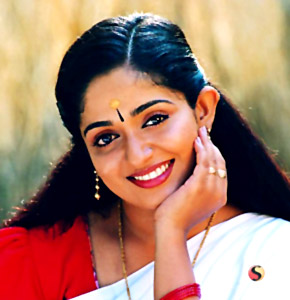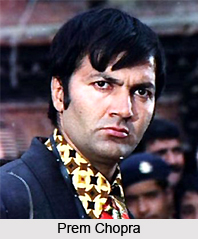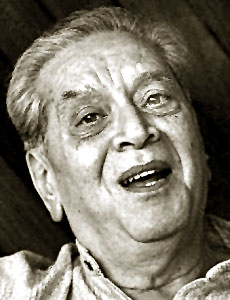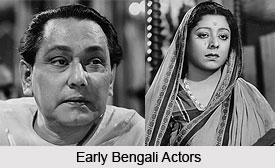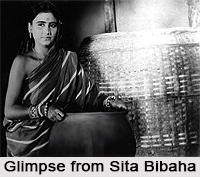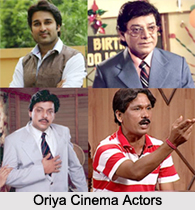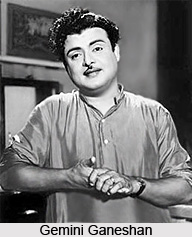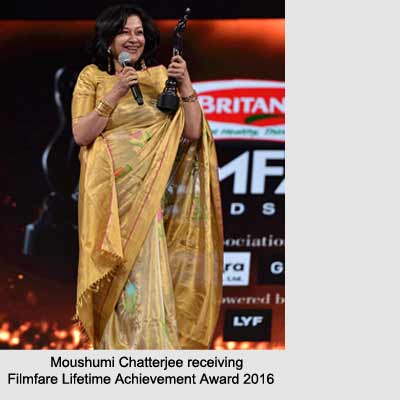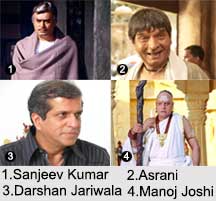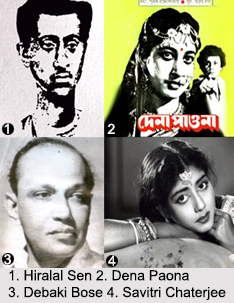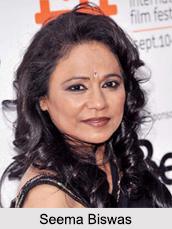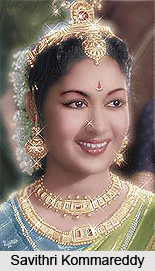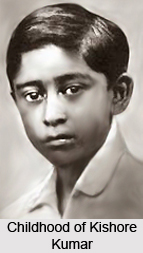 Kishore Kumar was born as Abhas Kumar Ganguly on August 4, l929. He was born into a family in the Khandwa town of Central Provinces and Berar, British India (now in the Indian state of Madhya Pradesh). Kunjalal Ganguly - his father was a lawyer, and his mother Gouri Devi belonged to a wealthy family. Abhas Kumar was the second youngest child of four siblings; the other three were Ashok Kumar (the eldest), Sati Devi, and Anoop Kumar. Ashok Kumar became a popular Bollywood actor, while Abhas Ganguly was still a child. Later, Anoop Kumar also ventured into cinema with the help of Ashok Kumar. Spending time with his brothers, Abhas Kumar also started to take a keen interest in the movies and music. He became a fan of singer-actor Kundan Lal Saigal and started to think him to be his guru. Kishore was the nickname of Abhas Kumar Ganguly.
Kishore Kumar was born as Abhas Kumar Ganguly on August 4, l929. He was born into a family in the Khandwa town of Central Provinces and Berar, British India (now in the Indian state of Madhya Pradesh). Kunjalal Ganguly - his father was a lawyer, and his mother Gouri Devi belonged to a wealthy family. Abhas Kumar was the second youngest child of four siblings; the other three were Ashok Kumar (the eldest), Sati Devi, and Anoop Kumar. Ashok Kumar became a popular Bollywood actor, while Abhas Ganguly was still a child. Later, Anoop Kumar also ventured into cinema with the help of Ashok Kumar. Spending time with his brothers, Abhas Kumar also started to take a keen interest in the movies and music. He became a fan of singer-actor Kundan Lal Saigal and started to think him to be his guru. Kishore was the nickname of Abhas Kumar Ganguly.
Kishore Kumar grows up to be a dark, skinny and somewhat shy little horror whose favorite sport is to sit on his father`s shoulders and play the tabla on his baldpate. Since he was the youngest of the siblings, he was the most pampered of the three kids at home. By this time, Ashok Kumar already left for Bombay to search for his fortune in films. Kishore Kumar did not know his eldest brother during his childhood much. He went puzzled when he saw that Ashok Kumar visited his house once a year and appropriated all the attention and love that his parents otherwise reserve for him. He called Ashoke Kumar as Dadamoni and Ashok Kumar summoned his small brother lovingly as "Kishoriyu". The moment he heard this call, he jumped up and clung to his elder brother like a monkey.
When in 1936, Ashok Kumar`s first film Jeevan Naiyya released. Seven-year-old Kishore decides to take his friends to big brother`s film at the local theatre, first-day, first-show. The boys till then saw stunt films but this time, they saw a thoroughly sober film. That very night Kishore wrote a letter to Ashok Kumar in Bombay, and asked him not to play such sensitive and shy roles and also told him that he should swing his fists about a bit in his next film. Kishore Kumar was the most mischievous student at the Pandit Makhanlal Chaturvedi Prathamik Vidyalaya in Bombay Bazaar. He was a big prankster but none of the teachers complained, partly because he was good in his studies and also because he was the brother of a famous film star in Bombay and thus all was forgiven.
Kishore Kumar along with the children of neighborhood would rig up a platform behind their house and created space for stage plays for the neighborhood kids. One of them became the hero, while another would dress up as a woman and be the heroine; a third was the villain, and so on. Kishore Kumar`s mother was a devout woman and performed all her religious duties. As a child Kishore Kumar`s voice was very shrill. His speech too, was not clear as he was often suffering from cough and cold. But he was very fond of singing. Although it was more like screeching than singing, his elder brother tried to train him in classical music and himself used to sing regularly
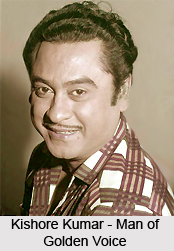 . Ashok Kumar had gifted him a small harmonium on his birthday. He carried it up to the terrace and sang to himself. He preferred solitude at times and also loved to imitate various people, especially K.L. Saigal. Whenever he was asked to sing, he would enquire whose song he should sing and then charged accordingly. He used to say Saigal`s song costed four annas and his own songs, only one anna. After some time, Saigal`s rate increased to one rupee, but his own rate remained the same.
. Ashok Kumar had gifted him a small harmonium on his birthday. He carried it up to the terrace and sang to himself. He preferred solitude at times and also loved to imitate various people, especially K.L. Saigal. Whenever he was asked to sing, he would enquire whose song he should sing and then charged accordingly. He used to say Saigal`s song costed four annas and his own songs, only one anna. After some time, Saigal`s rate increased to one rupee, but his own rate remained the same.
Kishore Kumar face the biggest trouble because of his coarse grating noise he let out whenever he tried to modulate his voice. Family elders joked it to be a broken bamboo. But he continued, undaunted by the taunts and promised himself to prove others. Till about ten years of age, his voice changed miraculously. Kishore Kumar used to hover constantly around his mother and would never let her go out of his sight. His favourite prank was to disturb the things that mother had neatly piled up. One day, when mother was chopping vegetables, he rushed in with such speed that his leg banged into the chopper and one of his tiny toes fell apart. In those days, surgical facilities or painkillers were not available and thus young Kishore suffered immensely from the pain and cried non-stop. He used to cry in pain for almost 20 hours daily and this continued for a month. Gradually, the wound healed and miraculously one month`s practice of crying suddenly cleared his voice and it became melodious.
He grew up and was admitted to the New High School for higher education. Kishore faced another serious problem. He used to score well in all subjects, but for mathematics. He was in the fifth standard and he could not solve a single question in the maths paper during the final examination. Somehow, he pretended to work on the sums and filled the answer sheet with tiny doodles, caricatures, rhyming couplets and happy faces. Before leaving the examination hall, he pleadingly requested one of his classmates to do the sums for him on a spare examination paper and took the sheet home to show his father.
The family members of Kishore Kumar suggested that Kishore had inherited these playful traits from his father. Their father had a great sense of humor and their neighbors used to crowd into the courtroom every time he made a declaration. Since Kishore spent a lot of time with his father, he too developed an excellent sense of humor. Kishore Kumar put this into use when he started his career in films too. In the beginning his elder brother used to rebuke him for not singing according to the tune, but that was his trademark style. Whenever anyone objected him about work, it would infuriate him. But rather than protesting on spot, he would go home and complain to mother.
After passing out of New High School, Kishore joined his brother Anoop at Christian College in Indore. Indore was the closest big city with a university. When he went to the hostel, everybody feared that he would fall ill because of the hostel food. But once in college, Kishore became a changed person and from the awkward callow youth longing to return home, he accepted hostel life with newfound vigor and eagerness. He had discovered "freedom" from his over-protective parents and was determined to make the most of every moment.
Unlike the other students, Kishore Kumar did not cut his hair short and also did not discard the dress he loved-a black overcoat with white pyjamas, muffler and leather sandals.
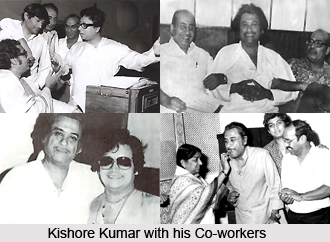 Wherever he went, he would stand out in a crowd for this costume. He confessed that he was superstitious about the black overcoat and could not remove it, as that would bring him bad luck. He made up many stories about falling ill, meeting with an accident, and so on just to avoid physical examination. He basically did not want to open his bulky overcoat because he was extraordinarily skinny for a 17-year-old and was actually scared of being mocked due to his poor physique. He was a brilliant athlete and participated in all kinds of sports wearing that overcoat again.
Wherever he went, he would stand out in a crowd for this costume. He confessed that he was superstitious about the black overcoat and could not remove it, as that would bring him bad luck. He made up many stories about falling ill, meeting with an accident, and so on just to avoid physical examination. He basically did not want to open his bulky overcoat because he was extraordinarily skinny for a 17-year-old and was actually scared of being mocked due to his poor physique. He was a brilliant athlete and participated in all kinds of sports wearing that overcoat again.
Kishore Kumar did not complete his graduation, since he was thoroughly bored of studies, particularly economics. He had a harmonium at the hostel room and would often spend evenings singing qawwalis and the latest film hits along with his friends. Kishore Kumar did not ever take any gratitude from his celebrity brother, when Ashok Kumar moved around with his car; Kishore did the rounds of studios by local train, bus and on foot. The childhood of Kishore Kumar was alike all other children, but his passion for music never got unnoticed. Wherever he was, he inflicted a spirit of joy and music together.







